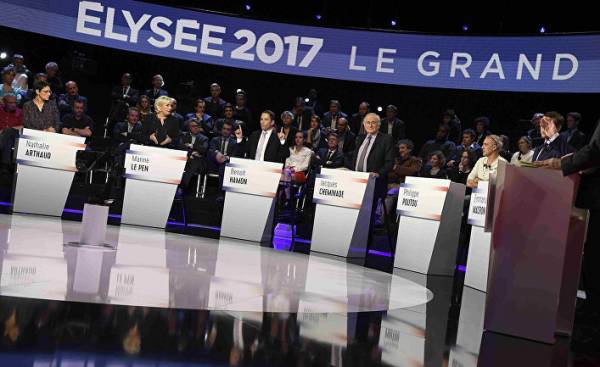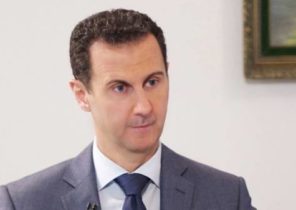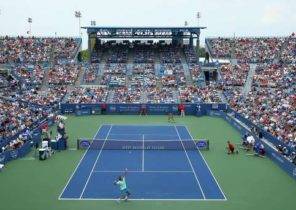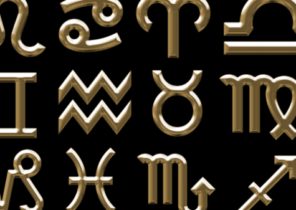
Few weeks France will elect a new President. As France’s head of state possesses significant powers — in particular, he has the right to dissolve the National Assembly, the presidential elections are held every five years, are the most important in the country. But this time the stakes are even higher than usual.
The two favorites of the campaign are marine Le Pen of the far-right National front and Emmanuel macron. He worked as economy Minister in the socialist government of President Francois Hollande, but takes part in elections as independent candidate. If, as expected, Le Pen and the Makron will meet in the second round of elections on may 7, for France, this turning point: for the first time in 60 years the two major parties of the country — left and right — will not be represented in the second round of the presidential election.
France had not experienced such a political shake-up since 1958, when, during the Algerian war came to power, General Charles de Gaulle, the Creator of the Constitution of the Fifth Republic. This change, like any major political event that was due to a combination of fundamental factors and the specific, momentary circumstances.
Today the situation is similar. First, fundamental factors. In France, as in most developed countries, there is now a growing mistrust of the people to the elites, people feel like they lose power, they experience fear in the face of economic globalization and immigration, dissatisfied with the fact that social mobility is facing down and the disparity is growing.
These sentiments, coupled with historically high role of the French state in the development of national identity and stimulating economic growth, led to increased support to the National front. But the nationalist, xenophobic rhetoric of Le Pen and her populist economic program similar to the ideas that are promoted and ultralevel candidate Jean-Luc Mélenchon.
The level of support for the National front has been growing for more than a decade, but still the party could not come to power in France, because of the electoral system with two rounds gives voters the opportunity to vote against the party in the second round. In addition, the national front is unable to create alliances, so the power remains in the hands of the major parties of the left and right flank, despite the fact that France is actually moving to a three-party political system.
Macron is trying to take advantage of the situation to break this three-party system. An important discovery of the Macron, which is initially a bit realized, is that the division into left and right blocked progress. Presidential elections provide a “Golden chance” to go beyond this system, without resorting to organized political movement. Because French people are now increasingly rejects the traditional party system, the initial weakness of the Makron quickly became his strong side.
As he acknowledges Makron, he was the best fragmentation of the left and right, which has intensified in recent years. This is especially true in the case of the left. Here there is a clear split between reformist current led by former Prime Minister Manuel Valls and traditionalists, which is the official candidate of the Socialist party, Benoit Hamon. The problems are compounded by the socialists because of the existence of the radical left forces that are actively trying to destroy them. In Spain the same way ultra-leftist party “Podemos” tried to substitute for the Socialist workers party of Spain.
Causes problems have a traditional right less clear. They generally keep the unity of economic and social issues. Moreover, just a few months ago it was expected that the right candidate is a Republican françois Fillon — will win in the first round by a large margin. But the scandal with his personal Affairs (he allegedly paid his wife and children for fictitious work as a member of Parliament) caused damage to his candidacy and, apparently, fatal.
Whatever the reasons for the decline of the right, the Makron this decline has brought huge benefits, like discord in the camp of the left. Now there is a real chance that this young, independent candidate on may 7 will become the President of France, turning the political system of the Fifth Republic.
But winning elections is only the first step. To control the hybrid presidential-parliamentary system of France the Makron will need a majority in the National Assembly. And there can be two possible scenarios.
In the first scenario, the Makron will quickly get the parliamentary majority, since French voters will want to keep his supporters in the June elections to the National Assembly. This is a real scenario, but not guaranteed: it is here that the lack of an organized political movement on the ground can be a major weakness of the Macron.
And that is why the result of the June elections would be the second scenario: the “coexistence” of the President and the parliamentary coalition, which will consist of a small far-right faction, the largest centrist faction and hopelessly divided factions of the extreme left. This situation is familiar to many European countries. But for France, whose Republican system has become a source of ideological division into the left and right, which is now policy in the West, it will be a real revolution. It can lead to the collapse of the Socialist party.
Because of the symbolic meaning of the division into left and right French voters and political leaders have long been consider any country’s problems solely from the point of view of ideology. Society and politicians have very little experience with governments that rely on the agreement of a broad coalition. Partly this explains why the country’s political system sometimes appears stalled, hindering the reform, and why the program Rules, with clear reform plan is so unusual for France.
If somehow in the first place will be Le Pen, then French politics, not to mention the European Union, waiting for a revolution. But even a moderate in the form of a Macron in reality, in its own way no less radical. And since both candidates are likely to take place in the second round, France will be on the verge of political revolution regardless of who wins.







